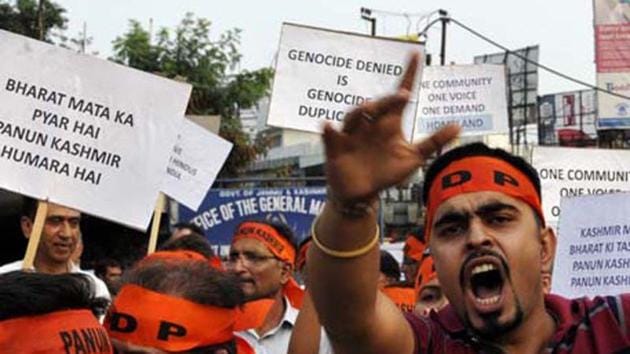We cannot be selective about the past in Jammu & Kashmir | Opinion
if we’re going to recall what’s happened to Pandits in 1990, then it’s wrong not to remember what happened to Muslims in Jammu in 1947. Hundreds of thousands were killed or expelled
These days, we hear a lot about what happened to Kashmiri Pandits in 1990. It’s often described as “ethnic cleansing” and “genocide”. For some, it’s justification for the recent de-operationalisation of Article 370. But not a word is spoken about what happened to Muslims in Jammu five decades earlier. That’s been completely forgotten. Yet, as Wajahat Habibullah, who was divisional commissioner (Kashmir) in 1990, when the Pandits were targeted, tells me this was “even more a case of genocide or ethnic cleansing”.

Now, it’s not my intention to diminish what happened to the Pandits. That was unacceptable and unforgivable. It was completely wrong. My aim is to tell you about the forgotten story of Jammu Muslims in 1947. If it’s right we should never forget or forgive the treatment of Pandits, then we have no excuse not to remember and continually condemn what was done to Jammu’s Muslims.
First, a little correction about the Pandit story. We’re told nearly 300,000 were thrown out of the Valley. Official records, however, suggest different numbers. In March 2010, the state government informed the legislature that of the total number of 150,000 Pandits, 24,202 families migrated in January 1990. At five persons per family, that comes to 121,010 people. The number of Pandits killed between 1989 and 2004 is put at 219.
Habibullah puts the figures a little higher. He says the total number of Pandits in 1990 was 200,000. After the migration that year, 20,000 were left. Over the next quarter century, that’s come down to around 3,500 people.
I turn now to Jammu just after Independence in 1947. At the time, it was a Muslim-majority city. But literally, in weeks, communal riots, mass killings and forced migration turned it into a Hindu-majority one. Both contemporary accounts and those of historians put the numbers killed or expelled in hundreds of thousands.
Writing in The Spectator in January 1948, Horace Alexander says: “Hindus and Sikhs of the Jammu area … apparently with at least the tacit consent of state authorities, have driven many thousands of their Muslim neighbours from their homes”. Citing Mahatma Gandhi, he asserts “some two hundred thousand are … not accounted for”. Christopher Snedden, in Kashmir: The Unwritten History, estimates between 70,000 and 237,000 Muslims were killed. Arjun Appaduri and Arien Mack in India’s World believe 200,000 could have been killed and a further 500,000 displaced. Last year, the columnist Swaminathan Aiyar wrote: “In sheer scale this far exceeded the ethnic cleansing of Pandits five decades later”.
So why is a horror of this scale not remembered? Habibullah, who’s written about it in My Kashmir: The Dying of the Light, suggests two reasons. First, it occurred when communal riots and brutal massacres were happening right across northern India. In that bigger outrage, this smaller tragedy seems to have been forgotten.
His second reason is intriguing. Sheikh Abdullah, then the undisputed leader of the Kashmir Valley, who one would have expected to draw attention to this massacre, deliberately chose to ignore it because the Muslims of Jammu did not support his National Conference, but leaned towards Jinnah’s Muslim League. The Sheikh’s politics seems to have silenced his conscience.
I realise that in terms of how much has changed since 1990, leave aside 1947, India is a very different country today. I also accept we need to move on and must not keep reliving the past. But if we’re going to recall what’s happened to Pandits in 1990, then it’s wrong – actually immoral – not to remember what happened to Muslims in 1947.
This is not a matter of intellectual honesty, though it’s that as well. It goes far deeper. It touches upon the unity of the multiple peoples and their identities that constitute India. We need to be conscious of all of them. If our memory becomes selective, it also becomes one-sided and that could divide us. We could end up a very different country to the one we want to be.
Karan Thapar is the author of Devil’s Advocate: The Untold Story
The views expressed are personal




